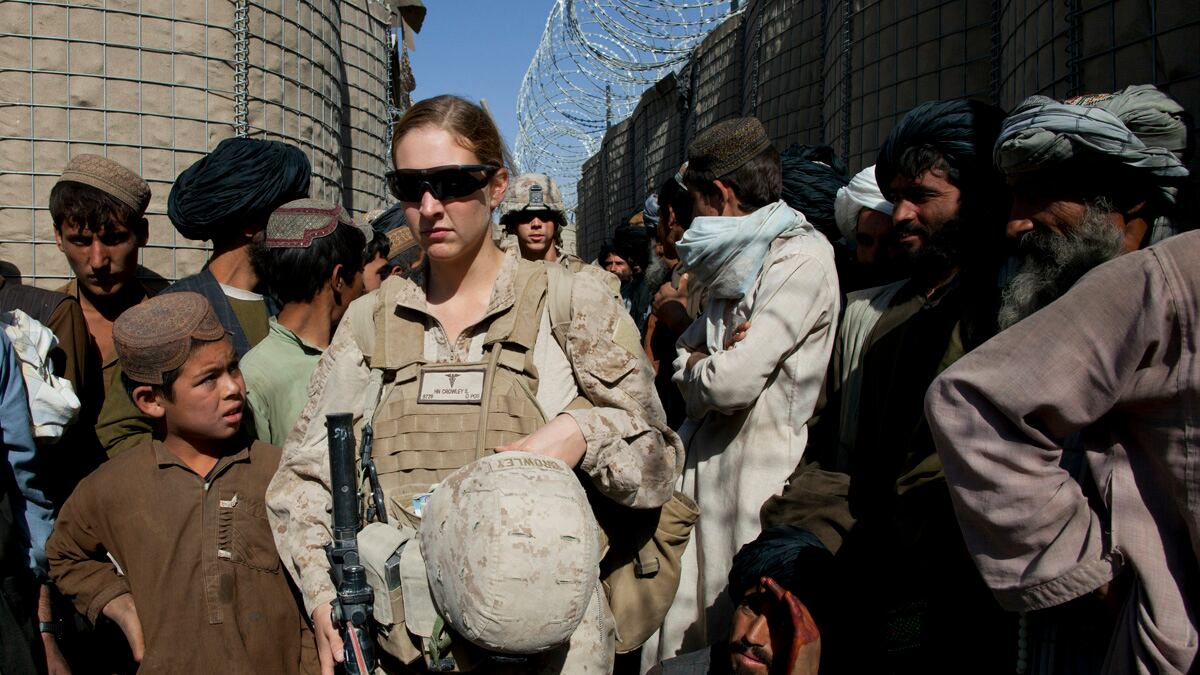On Thursday, the Pentagon issued a long-awaited announcement about its policy excluding women from serving in military combat roles. Starting this summer, women will be able to be permanently assigned to battalions, opening up 14,000 new roles for female service members. But they still will be barred from front-line infantry and special-op forces.
Coming a year after two separate advisory boards urged the Department of Defense to overturn its existing policy altogether, many female veterans feel that the announcement is too little, too late. One even called it a "slap in the face." Anu Bhagwati, a former Marine commander who is now executive director of the Service Women’s Action Network, said the Pentagon's refusal to overturn the ban not only is sexist, but potentially damaging to the military as a whole.
"That commission told the military last year that the military was holding itself back by not allowing women into these positions," Bhagwati said of the congressionally mandated Military Leadership Diversity Commission. The Pentagon's reluctance to adhere to these recommendations is, she said, "Based on ideology, not on reality."
Modern wars no longer are fought along strict battle lines. Defining what it even means to be “in combat” in places like Iraq and Afghanistan is much more difficult than it used to be. What's clear, however, is that women have played unprecedented roles in both battlegrounds. In Afghanistan, some 160 female volunteers have served in Female Engagement Teams (FET), counterinsurgency missions that have proved critical to U.S. efforts in the region. In Iraq, “Lionesses” served as support staff alongside Marine combat units. These weren’t violations of current policy, rather a bit of bureaucratic sleight of hand that had them “attached” to battalions, rather than permanently assigned. All told, more than 140 women have died fighting in Iraq and Afghanistan.
"We have women all over the battlefield right now,” says Col. Martha McSally, the first female Air Force pilot to fly in combat who this week announced she would run as a Republican in the Arizona race to replace Rep. Gabby Giffords. "You can’t draw a line between combat and noncombat." Official policy is, she says, little more than “legal fiction.” “It’s overinclusive and it’s underinclusive,” she continues. “It says no women can do this, and therefore all men can. Well, we know that’s not true either.”

“Why don’t we just set a standard and treat people based on their capabilities? Before I became a fighter pilot, everyone said that women didn’t have the physical strength,” she says. “Well, I had just completed the Hawaii Ironman Triathalon.”
Female soldiers and veterans say that once their fellow service members saw them in action, not only did doubts about their abilities disappear, but the units as a whole grew stronger. “When they’re finally exposed to women, and they see that ‘Oh, women are soldiers just like us,’ what happened was an interesting dynamic where a lot of the men would start performing better,” Bhagwati says. “Women tend to work twice as hard because of all of the stigma. The women in Iraq and Afghanistan are a perfect example of this. Integration has to happen in order to make the military better."
For some, Thursday’s news was bittersweet. Zoe Bedell was in charge of the Marines’ Female Engagement Team in Afghanistan from October 2010 to April 2011. When her tour ended, the Princeton University graduate decided to leave the military, and is now working in finance in New York. "The thing that absolutely affected my decision to get out was [asking myself] why I was in an organization that specifically views me as a second-class citizen, that refuses to judge me on my merits," she says. "This organization doesn’t value my contribution, not because of any rational factor I could control. I’m smarter than that; I’m more capable than that; I want to go somewhere where those things matter more than the length of my hair."
Bedell welcomes the change. “When this works—because it will work—they’re going to see that our ability to fight war doesn’t instantly disintegrate,” she says. “Baby steps are easier, frankly. I’d rather see it go all the way, but I’m not going to say no to some progress. I’m excited. It almost makes me wish I was still in.”





